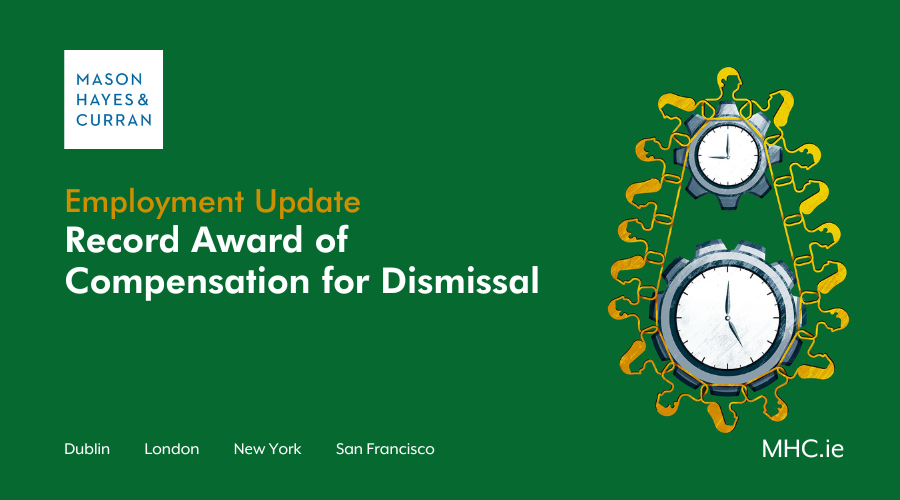Record Award of Compensation for Dismissal

A recent decision of the Workplace Relations Commission resulted in a record-breaking award of over €450,000 in compensation to a senior employee. The employee was held to have been unfairly dismissed without adequate notice. Melanie Crowley and Ger Connolly, Employment Law & Benefits partners, review this decision, its implications for employers and what they should do next.
The WRC recently determined that a former CEO, chairperson and founder of a company who had been unfairly dismissed was entitled to compensation of €440,000, plus a further €24,000 for failure to give him adequate notice of the dismissal. The fairness or otherwise of the complainant’s dismissal and the failure to give him notice were not in dispute; the only questions before the WRC concerned the quantum, or monetary value, of the award. These issues were complicated by the existence of a 12 month non-compete clause in the employee’s contract and the statutory duty on an employee who has been dismissed to mitigate their loss.
An unreasonable restrictive covenant?
The complainant was subject to a non-compete clause. This clause prohibited him from engaging, assisting or being interested in any business, trade concern or commercial activity competing with, taking preparatory steps to compete or intending to compete with his former employer in a geographically-defined area, which was not described by the WRC. These activities were prohibited without the written consent of his employer for a period of 12 months after the termination of his employment.
Evidence was accepted that the complainant was refused permission to form a new company to continue his work in the music business. The complainant’s evidence was also that his request to provide services to his former employer on a self-employed contractor basis was also refused. The respondent denied these points but did not submit any oral evidence to rebut them. After the termination of his employment, and in the absence of any waiver of the non-compete by his former employer, the complainant operated a holiday business from his home and worked as an artist.
The Adjudication Officer expressed some reservations about the non-compete clause, suggesting that it was not reasonable that the complainant be required to compromise his goal of re-establishing himself in business. The Adjudication Officer didn’t elaborate further on the point but did determine that it was not reasonable to expect the complainant to fully mitigate his loss in the light of the restrictive covenant.
Mitigating loss and non-competes?
The complainant alleged his financial losses ran for a period of 76 weeks, as this was the length of time it took to “re-establish himself in a similar role he was dismissed from”. The Adjudication Officer concluded that the complainant’s financial losses amounted to €460,000 and noted that the complainant’s duty to mitigate his losses was only triggered in the last 5 months of this period, that is the balance of the period after the 12 month non-compete expired. The complainant’s failure in this respect merited a reduction of €20,000, based on average industrial weekly earnings of €1,000 per week. The total compensation awarded was therefore €440,000.
The Adjudication Officer also considered that the manner of the complainant’s summary dismissal impacted his ability to mitigate his loss and extended the time for him to commence his new venture. However, the manner of his dismissal was not properly before the WRC, given that it was conceded by the respondent.
Conclusion
This case raises some significant practical issues regarding the relationship between post-termination restrictions and the duty to mitigate in unfair dismissal claims. Where an employer chooses to enforce restrictive covenants which then has a knock on effect on a dismissed employee’s ability to mitigate, the impact on an award of compensation is likely to be significant. The decision adds to the list of factors an employer should consider if an employee asks to be released from their non-compete, especially if there is any uncertainty around the “fairness” of the end of the employment relationship.
For more information and expert advice, contact a member of our Employment Law & Benefits team.
People also ask
How is WRC compensation calculated? |
In an unfair dismissal claim, the WRC can award up to 2 years’ gross remuneration limited to actual financial loss. An employee has a duty to mitigate their loss by actively seeking new employment after their employment ends with their previous employer. In the absence of any actual financial loss, an Adjudication Officer can award up to 1 month’s pay as compensation. There are however varying levels of compensation which can be awarded under different pieces of legislation. |
Can employers appeal a WRC decision? |
In unfair dismissal cases, either or both parties may appeal an Adjudication Officer's decision to the Labour Court within 42 days of the date of the decision. There is a further appeal to the High Court on a point of law only. |
Where can I find the decision? |
The decision, Kiely v Hyph Ireland Ltd (ADJ-00037708, 21 February 2024), is available at the following link: https://www.workplacerelations... |
The content of this article is provided for information purposes only and does not constitute legal or other advice.
Share this:




